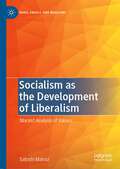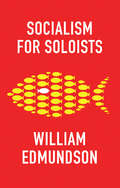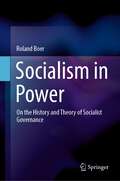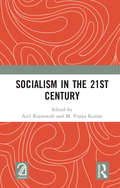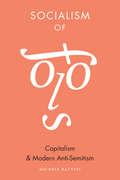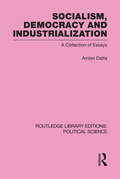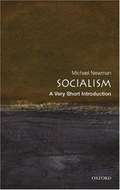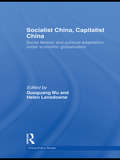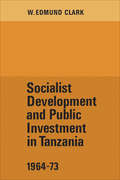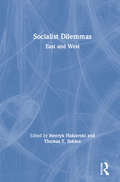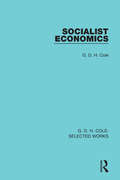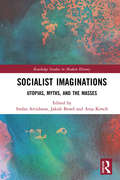- Table View
- List View
Socialism as the Development of Liberalism: Marxist Analysis of Values (Marx, Engels, and Marxisms)
by Satoshi MatsuiThis book addresses the question of what socialism is according to fundamental values rather than institutions. Arguing that Marxist socialism is not only more gradual but also more radical than how it is usually understood, this book shows that socialism extends liberalism by inheriting and furthering liberal justice, including fundamental human rights. Simultaneously, socialism ultimately rejects liberalism because it does not consider liberal values, such as liberty and equality, society’s primary principles. Satoshi Matsui offers a new theory: alienation has two dimensions. Marxists seek to rectify policies that violate justice in a capitalist society, and injustice in capitalism is alienation’s first dimension. From a communist society’s perspective, however, justice itself is an alienated idea and the second dimension of alienation. Marx’s theory of alienation does not deny the liberal theory of justice but is rather a universal system that encompasses it. By fundamentally reexamining Marxism, this volume provides a basic guideline for overcoming capitalist society and constructing a communist society.
Socialism before Sanders: The 1930s Moment from Romance to Revisionism
by Jake AltmanThe early years of the twentieth century are often thought of as socialism’s first heyday in the United States, when the Socialist Party won elections across the country and Eugene Debs ran for president from a prison cell, winning more than 900,000 votes. Less well-known is the socialist revival of the 1930s. Radicalized by the contradiction of crushing poverty and unimaginable wealth that existed side by side during the Great Depression, socialists built institutions, organized the unemployed, extended aid to the labor movement, developed local political movements, and built networks that would remain active in the struggle against injustice throughout the twentieth century. Jake Altman brings this overlooked moment in the history of the American left into focus, highlighting the leadership of women, the development of the Highlander Folk School and Soviet House, and the shift from revolutionary rhetoric to pragmatic reform by the close of the decade. As another socialist revival takes shape today, this book lays the groundwork for a more nuanced history of the movement in the United States.
Socialism for Soloists
by William EdmundsonThe idea of socialism is making a comeback, particularly among rising generations. Their interest is likely to prove transitory, however, if socialism ignores their yearning for individual autonomy. Why should “soloists” embrace socialism? In this highly original new book, William Edmundson argues that there are compelling reasons for even the most resolute of individualists to embrace socialism. Political equality is incompatible with private ownership of the means of production – which today incorporates not only the highway system, the currency, and the power grid but also platforms like Amazon, Facebook, and Google. Socialism is therefore essential to protect the basic liberal rights and freedoms that underpin our social contract. This pathbreaking defence of liberal democratic socialism will be essential reading not only for all on the left, but also for students and scholars of liberalism, libertarianism, and the social contract.
Socialism for Today: Escaping the Cruelties of Capitalism
by David M. KotzCapitalism is failing us. Instead of bringing a decent life for the majority, it generates an outrageous gap between the rich and the rest, unaffordable housing, a profit-driven healthcare system, skyrocketing educational debt, racial and gender inequality, and the threat of climate disaster. Economist David Kotz argues that it’s time we built a new socialism for the unique challenges of the twenty-first century.The problems of capitalism are too profound for reform, Kotz writes. Reform can help, but only temporarily, and not for all. Nor can we turn back to the socialist experiments of the twentieth century. But we can learn from those experiments, both their successes and failures, to build a democratic and participatory economic and political system. The result would be a sustainable future of economic justice, equality, material comfort, human development, and meaningful freedom. The journey towards a new socialism may be difficult. But Kotz combines a clear and rigorous account of how socialism can be made to work with a realistic strategy for how to get there. This is the book we need to help us escape the cruelties of our capitalist present.
Socialism in Marx’s Capital: Towards a Dealienated World (Marx, Engels, and Marxisms)
by Paresh ChattopadhyayThis book explores how Marx envisaged society after capital(ism) by a close examination of the idea of socialism in the text(s) of Capital. Going beyond Marx’s critique of the Gotha Programme, Paresh Chattopadhyay challenges those who leave Capital aside in discussions of socialism in Marx’s works on the grounds that it is uniquely preoccupied with the critical analysis of capitalism. Instead, Chattopadhyay shows how Marx, in Capital, considered capitalism as a simple transitional society preparing the advent of socialism envisioned as an association of free and equal individuals.
Socialism in Power: On the History and Theory of Socialist Governance
by Roland BoerThis book examines the historical development—in practice and theory—of governance in socialist systems. With more than a century of such development from many parts of the world, including the Soviet Union, China, and the DPRK (North Korea), it is possible to gain much from careful study of their political systems.But what is the nature of this socialist governance? It is abundantly clear that the type of governance in socialist countries had never before been seen in human history. How does this governance work? What was the political theory that arose from the practice? How did this type of governance develop over time and in light of specific conditions?These are the questions that Socialism in Power sets out to answer. It does so not by using methods developed for studying Western liberal nation-states, but by deploying Marxist-Leninist analysis. Not an abstract Marxism, but concrete Marxism, as it was applied and developed in light of the particular historical conditions of the countries in question.The book begins with careful analysis of the works of Marx and Engels, with a particular emphasis on Engels, who was crucial in establishing the basic principles of socialist governance. Next, the book focuses on the Soviet Union, which was the first country in human history to experience socialism in power. The rarely studied DPRK (North Korea) comes next, as a transition to East Asia, followed by a number of chapters on China, which arguably has the most developed form of socialist governance.
Socialism in Practice: The Transformation of East Europe
by Scott NearingFirst published in 1962, this book is a study by author Scott Nearing on Communism in Eastern Europe, where he spent three months during the winter of 1961-1962. Together with his wife Helen, he visited Bulgaria, Czechoslovakia, the German Democratic Republic, Hungary, Poland, Romania and Yugoslavia.As self-proclaimed socialists, Nearing’s report “is neither objective nor is it neutral”, but rather seeks to “present to the American people the frightening lack of information in North America concerning [current] developments in East Europe.”Based on his personal observation during his travels through Bulgaria, Czechoslovakia, the German Democratic Republic, Hungary, Poland, Romania and Yugoslavia, the author stands firm that “news of socialist construction in East Europe should be immensely valuable to Western peoples who want to see order, decency, peace and improvement in the world.”
Socialism in a Cold Climate (Routledge Revivals)
by Michael Mann Julian Le Grand Doreen Massey Jane Lewis Colin Crouch Meghnad Desai Tony Atkinson Chris Husbands Howard Glennerster Robert Power Mike ReddinFirst published in 1983, this important and stimulating book is a thoughtful contribution to the debate about the first steps that needed to be taken to build a socialist society in the 1980s. It covers topics as diverse as concepts of equality and fairness, sexual discrimination, economic policy, health and urban policy, pensions, poverty and the economics of the welfare state, defence and internationalism.
Socialism in the 21st Century
by Anil Rajimwale; M. Vijaya KumarThe present collection contains papers of the first national workshop organised by the All India Progressive Forum (AIPF) on '21st Century Socialism' in Hyderabad. Socialism is a controversial issue, rendered more controversial by the great collapse of the Soviet Union and the East European socialist regimes. The collapse has reignited the controversies on the nature, path and viability of socialism in its many interpretations. In the meantime the scientific and technological revolution has added new features to the theory of social transformation, and has reopened many issues settled by history of individual revolution. The papers discuss many old and new aspects of socialism, social revolution and transformation. They also seek to add many new features. They particularly emphasize the notion that socialism of '21st century' will be different, in many crucial ways, than that of the 20th century.Please note: This title is co-published with Aakar Books, New Delhi. Taylor & Francis does not sell or distribute the Hardback in India, Pakistan, Nepal, Bhutan, Bangladesh, Maldives and Sri Lanka.
Socialism of Fools: Capitalism and Modern Anti-Semitism
by Michele BattiniIn Socialism of Fools, Michele Battini focuses on the critical moment during the Enlightenment in which anti-Jewish stereotypes morphed into a sophisticated, modern social anti-Semitism. He recovers the potent anti-Jewish, anticapitalist propaganda that cemented the idea of a Jewish conspiracy in the European mind and connects it to the atrocities that characterized the Jewish experience in the nineteenth and twentieth centuries.Beginning in the eighteenth century, counter-Enlightenment intellectuals and intransigent Catholic writers singled out Jews for conspiring to exploit self-sustaining markets and the liberal state. These ideas spread among socialist and labor movements in the nineteenth century and intensified during the Long Depression of the 1870s. Anti-Jewish anticapitalism then migrated to the Habsburg Empire with the Christian Social Party; to Germany with the Anti-Semitic Leagues; to France with the nationalist movements; and to Italy, where Revolutionary Syndicalists made anti-Jewish anticapitalism the basis of an alliance with the nationalists. Exemplified best in the Protocols of the Elders of Zion, the infamous document that "leaked" Jewish plans to conquer the world, the Jewish-conspiracy myth inverts reality and creates a perverse relationship to historical and judicial truth. Isolating the intellectual roots of this phenomenon and its contemporary resonances, Battini shows us why, so many decades after the Holocaust, Jewish people continue to be a powerful political target.
Socialism on Trial: Testimony In Minneapolis Sedition Trial
by James P. CannonIt is absolutely true that Hitler wants to dominate the world, but it is equally true that the ruling group of American capitalists has the same idea. We’re not in favor of either of them. Quote by James P. Cannon from the witness stand, in federal court, 1941 James P. Cannon was the central defendant among the eighteen leaders of the Socialist Workers Party and Upper Midwest labor movement framed up in 1941 and imprisoned two years later on charges of conspiring to advocate the overthrow of the US government. Their “crime”? Organizing opposition within the broad labor movement to Washington’s drive to enter World War II. The US rulers tried to convince workers and farmers they would be fighting and dying “to defeat fascism.” Leaders of the SWP and of the massive Teamsters Central States over-the-road organizing campaign told them the truth. Cannon’s testimony clearly and forcefully presents the communist program of the fighting vanguard of the working class. Also available here is “Communist Policy in the Minneapolis Trial: James P. Cannon Answers His Ultraleft Critics,” drawing lessons from a century of struggles by the working class to wrest state power from the capitalists.
Socialism the Active Utopia: The Active Utopia (Routledge Revivals #No. 3)
by Zygmunt BaumanRather than contributing to the long-standing discussion about the characteristics of the society that socialism proposes to establish, this Routledge Revival, initially published in 1976, aims to explore the impact of the ‘living utopia’ of socialism on the development of modern society. It begins with an analysis of the role of utopia in general, and of the socialist utopia in particular; Bauman considers the opposition between ‘utopian’ and ‘scientific’ social thought; He presents socialism as the ‘counter-culture’ of capitalist society; The book finally examines the reasons for the failure of socialism in its application to the peasant revolution in Russia. It then explores some possible forms that the socialist utopia might take in the industrial societies of the late twentieth century. Professor Bauman writes for those who want to understand the logic of the historical fate of socialism in the present century, who are concerned about the validity and vitality of socialist ideas on the development of modern society, and who are interested, and perhaps confused, by the cultural and ideological conflicts of the last few decades.
Socialism with Chinese Characteristics: A Guide for Foreigners
by Roland BoerThis book covers the whole system of Socialism with Chinese Characteristics, dealing with Deng Xiaoping’s theory, the socialist market economy, a moderately well-off (Xiaokang) society, China’s practice and theory of socialist democracy, human rights, and Xi Jinping’s Marxism. In short, the resolute focus is the Reform and Opening-Up. Socialism with Chinese Characteristics is one of the most important global realities today. However, the concept and its practice remain largely misunderstood outside China. This book sets to redress such a lack of knowledge, by making available to non-Chinese speakers the sophisticated debates and conclusions in China concerning socialism with Chinese Characteristics. It presents this material in a way that is both accessible and thorough.
Socialism, Democracy and Industrialization (Routledge Library Editions: Political Science #53)
by Amlan DattaIs it possible to evolve a form of socialism which, while promoting industrial development, will be merciful to the ideals of democracy? This book attempts to answer this question: first the author deals with the differing conceptions of socialism and democracy and discusses co-operative socialism. The he turns to the problem of industrialization; the need for leadership in economic transition and the role of the concept of property; the capitalist solution; decentralization; and finally industrialization within the democratic framework.This book raises issues which are as important now as when it was first published in 1962.
Socialism, Markets, and the Critique of Money: The Theory of “Labor Notes” (Marx, Engels, and Marxisms)
by Tsuyoshi YukiThis book provides a comprehensive overview of historical and international debates on the theory of “labor money” or “labor notes.” These debates exist in a triangular context of market socialism, communism (community-based socialism), and local currency, joining numerous socialists, anarchists, and Marx and Engels. Labor note theory encompasses theoretical, ideological, and practical doctrines aimed at designing a fair and desirable labor-based market or non-market economy by reforming the monetary and credit system. This theory was considered an unfeasible utopian idea in the context of orthodox Marxism, which is typically based on a historical study of surplus value doctrines. However, this book eschews Marx’s critique of “labor money” that limits the debate regarding a concrete alternative society, and instead proposes practical and gradual approaches to social reform by scrutinizing the primary sources of labor money theories and practical experiences and reconstructs their theoretical relationships.
Socialism, Revolution, and Internationalism: A Lecture Delivered In Paris, November 27 1893
by Gabriel DevilleSocialism, revolution, internationalism—these are the three subjects regarding which I beg your permission to say what—with no pretence of being infallible—I believe to be the truth. At the risk of telling you nothing new, I will simply try to speak truth. Those who reproach the socialists for constantly repeating the same thing, have, no doubt, the habit of accommodating the truth to suit their taste for variety. On the other hand, to talk of socialism is to do what everyone else is doing at this time, but I will speak to you of it from the standpoint of a socialist, and—unhappily—that is not as yet equally common.
Socialism: A Very Short Introduction
by Michael NewmanToday, most people think of socialism as an outdated ideology. In this Very Short Introduction, Michael Newman seeks to place the idea of socialism in a modern context for today's readers. He explains socialist ideas in the framework of its historical evolution, from the French Revolution to the present day, and examines practical attempts to implement socialism. Not just another history of socialist ideas, this book aims for a different approach that looks at practice as well as theory--centering on the contrast between Communism and Social Democracy. The relationship between socialism and notions of democracy, freedom, and equality is also discussed. Newman brings the subject entirely up to date by tackling contemporary forms of socialism. While the book's focus is on Europe and the Soviet Union, it is set in a broader geographical context. Newman's fresh approach to the subject enables the reader to re-evaluate socialism.
Socialisms: Old and New
by Tony WrightThis is a revised and updated edition of Tony Wright's critically acclaimed work that first appeared a decade ago. It provides a lucid and accesible survey of the major strands of socialist thinking right up to the present day and includes an assessment of the renewal of socialism in Britain. It is an indispensable text for students and a stimulating guide to socialism past and present. But it is also a book with an argument. Tony Wright makes the case for a socialism that learns the lessons of its own history, roots itself in an ethic of community and applies traditional values in new ways. It is a book for everyone who wants to understand where socialism has come from - and where it might still be going.
Socialism—The Tragedy of an Idea: Possible? Inevitable? Desirable?
by Lajos BokrosThis book explores the idea of socialism from three angles and raises the questions if socialism is possible, inevitable, and desirable. Socialism as an economic and societal system was possible based on the two most important pillars of Marxian political economy: State ownership in the means of production and mandatory central planning (command economy). Nevertheless, these two characteristics are compatible only with dictatorship. On this basis, socialism is neither inevitable nor desirable, because it excludes competition, freedom, democracy, and the rule of law.The three questions are analyzed through the academic work of five towering figures: Joseph A. Schumpeter, Karl Polanyi, Friedrich A. Hayek, Karl Popper, and Hannah Arendt. The theoretical findings and inferences resulting from this analysis are compared with the reality of socialism as it existed rather than an imaginary uncontroversial blueprint of socialism.The book discusses the evolution of Soviet communism and its attempts with market reforms to solve its inherent contradictions. It concludes that totalitarian regimes tend to fail in reforms because market freedom is inconsistent with totalitarian control. The author makes a strong case against dictatorship, also in the context of the spreading of nationalist populism around the globe. This book is a must-read for everybody interested in a better understanding of the ideas of socialism, totalitarianism, and populism.
Socialist China, Capitalist China: Social tension and political adaptation under economic globalization (China Policy Series)
by Guoguang Wu Helen LansdowneChina is currently encountering increasing social problems, together with the rise of mass discontent and public protest, despite having achieved enormous economic growth after nearly thirty years of market socialism and embracing globalization. The future of China thus depends not only on the economic progress the nation has achieved - and will achieve - but also on how the government addresses growing social tensions. Focusing on why social tensions have arisen despite economic prosperity and how the state is responding, this book presents rich, original data about many of the social challenges facing China, including rural-urban migration, unemployment, the health care crisis, the rise of religion, the desire for increased individualism, and new mass movements. It investigates governmental responses to deal with the problems including legal and political reforms and local governance innovations, throughout setting the discussion in the context of how far a traditionally ‘socialist’ nation can be integrated into global capitalism. Overall, the book provides a timely, up-to-date, and down-to-earth examination of and reflection on China’s continuing socio-economic and political transition.
Socialist Cuba: Past Interpretations And Future Challenges
by Sergio Diaz-Briquets Sergio G Roca Rhoda Rabkin Carmelo Mesa-LagoThis book examines change within continuity and analyzes stability within revolution. It focuses on uneven rate of development among the political, economic, and social realms of revolutionary life in socialist Cuba; on the implications of the changes unleashed by the Third Party Congress in 1986.
Socialist Development and Public Investment in Tanzania, 1964-73
by W. Edmund ClarkWith its emphasis on rural development as opposed to urban development, Tanzania has pursued an individual path in socialist development. This work is the first empirical analysis of public investment in matters of agriculture, education, rural health, manufacturing, and commerce, comparing the actual program of investment to the strategy outlined in the Arusha Declaration of 1967. In Socialist Development and Public Investment in Tanzania 1964-1976, Dr Clark finds that Tanzania has been more successful in reorienting its program of social investment than its program of economic development. This failure stems from real differences within Tanzania, and among socialists generally, about appropriate investment strategies for a country at Tanzania's stage of development. In fact, no clear specification of an economic strategy exists and, as a result, policy has been heavily determined by the interests of the dominant political groups. It also reflects the fact that, in its initial stages, Tanzanian socialism was not a mass movement. It was imposed from the top and consequently, the bureaucracy remains relatively immune from the pressures of the people and the poverty in which they live. Dr Clark argues that Nyerere's basic strategy is appropriate to Tanzania at a stage when it lacks the resources to pursue the traditional socialist goal of an integrated industrial economy, but that the implementation of this strategy should and must be improved. Skillfully blending political and social with economic analysis, he provides a provocative interpretation of socialist investment strategy in Tanzania and provides an illuminating perspective on the economics of developing countries.
Socialist Dilemmas: East and West
by Henryk Flakierski Thomas T. SekineThis book, consisting of eight related articles, deals with several dimensions of socialism in the 1980s just before the beginning of the great changes which took place in Eastern Europe. Profound changes in the political economy of the world in the 1970s led to a decline of over-confidence and over-optimism characteristic of the earlier times both in the West and in the East. The painful experience of stagnation ended the grand Keynesian dream and led to the return of neo-conservatism in the West. The disappointing pace of industrial and technological progress during the Brezhnev era and increasing shortages of productivity of communism in the East. With both sides in the grip of political and economic uncertainties, the ideological confrontation seemed to have lost much of its sharp edge. No longer did the accepted dogmas and ideologies of the past appear either valid or convincing. The presupposition of the debate on comparative economic systems were in need of fundamental revisions. It was in this perspective that the Political Economy Workshop at York University undertook to feature a series of lectures on socialism in its 1988 sessions. Of about a dozen presentations by York University scholars and invited speakers, eight were subsequently made available in the form of articles and are published in this volume. These articles cover a wide range of issues, both theoretical and practical, and from both the Western and the Eastern perspective. It is recognized by all authors that neither the East European experiments in communism nor the Western process into social democracy have been a great success. The clue to what might lie beyond the socialist dilemmas in the age of perestroika will be found only by going through once again to the circumstances which led to the failure of socialism thus far.
Socialist Economics (Routledge Library Editions)
by G. D. ColeThis volume sets forth as simply as possible the theoretical foundations which underlie the practical policies of democratic Socialism. This involves both a repudiation and a refutation of the assumptions of the older classical economists who believed in laissez-faire, and a careful differentiation of the economics of democratic Socialism from the neo-classical doctrines associated with the name of Maynard Keynes.
Socialist Imaginations: Utopias, Myths, and the Masses (Routledge Studies in Modern History)
by Stefan Arvidsson Jakub Beneš Anja KirschThis volume offers new perspectives on the appeal and profound cultural meaning of socialism over the past two centuries. It brings together scholarship from various disciplines addressing diverse national contexts, including Britain, China, France, Germany, Norway, Sweden, and the USA. Taken together, the contributions highlight the aesthetic, narrative, and religious dimensions of socialism as it has developed through three broad phases in the modern era: early nineteenth-century beginnings, mass-based political organizations, and the attainment of state power in the twentieth century and beyond. Socialism did not attract millions of people primarily because of logical argument and empirical evidence, important though those were. Rather, it told the most compelling story about the past, present, and future. Refocusing attention on socialism's imaginative dimensions, this volume aims to revive scholarly interest in one of the modern world¹s most important political orientations.
